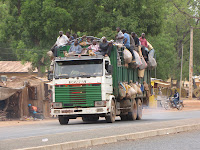Caught our first Peugeot 504. These cars are either assembled in Nigeria or brought over from Europe and have three rows of seats. They are built to take the driver and seven passengers, and are called
sept place, but in true African style they crammed 9 of us in and stacked the bags and parcels high on the roof rack. It was a comfortable trip nevertheless and for the kilometres that they do it is amazing that they can still keep going under so much weight. As with the minivans we had to wait about two hours for the seats to fill and were able to find a spot in the shade to do it. We were visited by the tee shirt sellers, bread sellers, and water sellers. Water is sold in clear plastic pillows and contain about 250 mls. The mothers bite a corner off the bag and their babies are well used to sucking out the water they need. In no time the bags are finished with and litter every drain and street. Parcels of bags are often sitting in the sun for days on end outside stalls as they have no storage area for them out of the heat and sun. It is often sold as
pure water and has been treated in a factory so is safe to drink. Sometimes well water is also sold in plastic bags but it has no advertising printed on it so we know what is treated and what is not. Usually the water is chilled and carried on a round dish or in a large cool bin on the womens' head. The road to Natitingou was potholed and we covered the 200 kms in 3 1/2 hours. Sometimes the driver had to drive on the road edge. We were in the back where there were three places and no window and luckily had a skinny guy with us. The middle seat had a huge woman and a huge man and the two skinny men between them shuffled often to get themselves comfortable. We saw a sign for an auberge we had seen in our guide so asked the driver to let us off. The auberge was run by a woman who had lived in Europe as her brother was a diplomat there. It was a huge area of land with a few trees and the soil was dry and rocky. We were given a round thatched room with four single beds and nets. The TV only had one French channel but the best thing was that they had free Wifi that was reasonably good.

These carved chairs sat on the verandah and were surprisingly comfortable to sit in. There are a lot of carved masks and other wooden souvenirs for sale but it is sad to see how denuded of trees the hills around this area are. There are going to be no trees left to make these souvenirs in the future!

This amulet was hanging on the wall. It has small leather bags with powdered animal parts in it and a snake skeleton as well as cowrie shells. Sometimes we see the small babies with leather pouches around their necks or waists to ward off evil spirits .

These local kids were getting out of school and rushed over to say hello and watch us. As soon as John got the camera out they shuffled up tightly to get in the picture. When he showed them the photo they squealed with delight.
Fortunately we haven't had to resort to this kind of transport ...yet! These guys were headed for the Burkino Faso border.
Caught up with our Belgian friend, Frederic in Nati and spent time chatting and eating in the evenings. He is vegetarian and has a lot of problems finding food without any bits of meat in it. The most popular vegetables to get in the local eating places are cabbage, onion and carrots. The markets have eggplants, peppers, tomatoes and okra but we rarely see them on the menu. Every place has rice, from Thailand, couscous, spaghetti, potatoes, yams, maniaoc, and canned peas.
We met a Dutch man and his daughter who had visited the national park and had been lucky enough to see elephants and lions. She had been working for a diplomat from Denmark with a Dutch wife and was looking after their children for six months. He came over to visit and take her home again. They were the only other westerners we saw in Nati.
 These carved chairs sat on the verandah and were surprisingly comfortable to sit in. There are a lot of carved masks and other wooden souvenirs for sale but it is sad to see how denuded of trees the hills around this area are. There are going to be no trees left to make these souvenirs in the future!
These carved chairs sat on the verandah and were surprisingly comfortable to sit in. There are a lot of carved masks and other wooden souvenirs for sale but it is sad to see how denuded of trees the hills around this area are. There are going to be no trees left to make these souvenirs in the future!  This amulet was hanging on the wall. It has small leather bags with powdered animal parts in it and a snake skeleton as well as cowrie shells. Sometimes we see the small babies with leather pouches around their necks or waists to ward off evil spirits .
This amulet was hanging on the wall. It has small leather bags with powdered animal parts in it and a snake skeleton as well as cowrie shells. Sometimes we see the small babies with leather pouches around their necks or waists to ward off evil spirits . 
